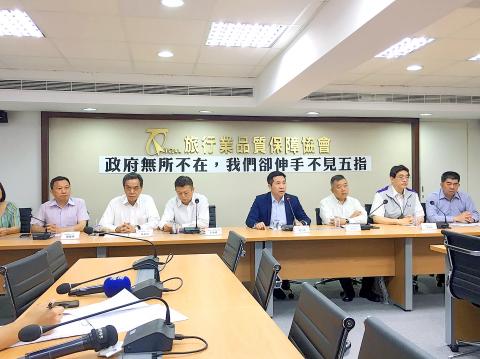Travel agents yesterday urged the government to amend the Civil Code as well as the terms of a standardized contract signed between travel agents and travelers to relieve the agents from responsibility when flights are delayed or canceled due to reasons beyond their control.
The Travel Quality Assurance Association, whose members include most of the nation’s travel agents, held a news conference in Taipei in response to a strike by EVA Airways’ flight attendants, which entered its 11th day yesterday.
The government should require unions to give advance notice of strikes and amend the clauses in the Civil Code’s travel section, association deputy chairman Johnny Huang (黃文卿) said.

Photo: Hsiao Yu-hsin, Taipei Times
The terms of the contract should also be changed to waive agents’ responsibilities when travelers are affected by incidents not attributable to the agents, including strikes by airline employees and airlines filing for bankruptcy or suspending flights without advance notice, he said.
The Civil Aviation Act (民用航空法) should require airlines to guarantee that they will fulfill the terms of the contracts they sign with travel agents and travelers, just as travel agents do with travelers, Huang said.
Airlines need to compensate travelers and travel agents if the latter incur losses due to the former’s actions, he said, adding that airlines offering services in Taiwan are required to follow the regulation.
Using the EVA strike as an example, Huang said travel agents would help travelers stranded overseas return home and pay all the related expenses on behalf of the airlines first, but the standardized contract should clearly state who should pay for transport costs under each circumstance — the government, the airline or the travelers.
“Any business has risks, but our risks should stem from the decisions we make ourselves, such as investing in a deal at a bad time or choosing a wrong target to invest in. Strikes at airlines should not be a business risk we have to bear,” Huang said.
As there are no clear regulations, some travel agents are still trying to get back the money they had spent bringing back travelers stranded overseas when TransAsia Airways declared bankruptcy four years ago, he said.
EVA Airways has promised to cover the food and accommodation expenses that travelers have incurred when they had to spend extra days in foreign countries because of the strike, Huang said.
The airline also promised to cover the cost of switching to other carriers, as long as travelers provide receipts, he said.
Travel agents or consumers would need to show their receipts for the money they had spent on food and accommodation as well.
Travel agents estimate that they have paid more than NT$100 million (US$3.23 million) on behalf of EVA, Huang said, adding that their total losses from the strike could top NT$1.8 billion.
Airlines and travel agencies are not on equal terms, he added.
“We pay airlines to secure flight reservations. They simply refund us the money when they cancel flights and are not required to offer any additional compensation. However, when airlines allocate a certain number of seats to us, we are expected to sell well or they confiscate our deposits,” he said.
Huang said they would work with lawmakers to amend the regulations after the strike is over.
In other developments, the Ministry of Transportation and Communications said that the airline’s transport capacity yesterday rose to 62 percent, adding that it has canceled more than 1,000 flights since June 20.
Evergreen Group subsidiary Uni Air’s domestic flights are not affected by the strike, with only changes in the departure time of some flights to Kinmen, it said.

Costa Rica sent a group of intelligence officials to Taiwan for a short-term training program, the first time the Central American country has done so since the countries ended official diplomatic relations in 2007, a Costa Rican media outlet reported last week. Five officials from the Costa Rican Directorate of Intelligence and Security last month spent 23 days in Taipei undergoing a series of training sessions focused on national security, La Nacion reported on Friday, quoting unnamed sources. The Costa Rican government has not confirmed the report. The Chinese embassy in Costa Rica protested the news, saying in a statement issued the same

Temperatures in New Taipei City’s Sindian District (新店) climbed past 37°C yesterday, as the Central Weather Administration (CWA) issued heat alerts for 16 municipalities, warning the public of intense heat expected across Taiwan. The hottest location in Taiwan was in Sindian, where the mercury reached 37.5°C at about 2pm, according to CWA data. Taipei’s Shilin District (士林) recorded a temperature of 37.4°C at noon, Taitung County’s Jinfeng Township (金峰) at 12:50 pm logged a temperature of 37.4°C and Miaoli County’s Toufen Township (頭份) reached 36.7°C at 11:40am, the CWA said. The weather agency yesterday issued a yellow level information notice for Taipei, New

Taiwan’s Liu Ming-i, right, who also goes by the name Ray Liu, poses with a Chinese Taipei flag after winning the gold medal in the men’s physique 170cm competition at the International Fitness and Bodybuilding Federation Asian Championship in Ajman, United Arab Emirates, yesterday.

A year-long renovation of Taipei’s Bangka Park (艋舺公園) began yesterday, as city workers fenced off the site and cleared out belongings left by homeless residents who had been living there. Despite protests from displaced residents, a city official defended the government’s relocation efforts, saying transitional housing has been offered. The renovation of the park in Taipei’s Wanhua District (萬華), near Longshan Temple (龍山寺), began at 9am yesterday, as about 20 homeless people packed their belongings and left after being asked to move by city personnel. Among them was a 90-year-old woman surnamed Wang (王), who last week said that she had no plans